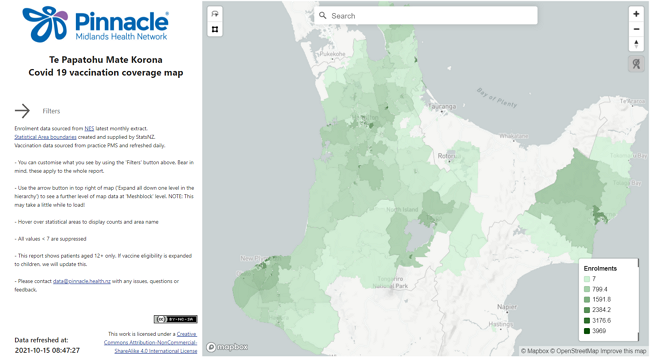
Pinnacle launches data app in iwi vaccination collaboration
Increasing vaccination rates for Māori and vulnerable people in our communities is the catalyst behind Pinnacle’s release of its innovative new vaccination data app.
A first of its kind, the app supports Hauora and iwi providers in Pinnacle’s Midland network to determine where action and advice around COVID-19 vaccinations is most needed.
Data used in the app is drawn from Pinnacle’s member practices*, enabling leaders to identify, at street level, where its unvaccinated population is. Brandi Hudson, Pinnacle Māori health director, says it will help iwi make strategic decisions about which areas of a town or city they should be directing their efforts towards.
“This data will show iwi that instead of having a mobile vaccination centre by a supermarket, they might be better off having it at the local sports grounds,” says Hudson. “Which areas of a town or city should they drop pamphlets or have people available to kōrero? This app can help them make that decision.”
Sharing of data encourages kōrero
Alex Poor, Pinnacle chief data officer, says the app is particularly exciting because it will benefit the people who need it the most. “Sharing this level of data is quite unique, but we see it as our duty to share it safely for the benefit of our Māori people and most vulnerable communities.
“We’ve undertaken significant due diligence to ensure details about individuals can’t be identified. But the app still provides useful information that can be beneficial for iwi to help support their communities.”
Poor says a key difference between Pinnacle’s data and that released by the Ministry of Health is the level of detail the app provides. “MOH data provides valuable insight to level SA2; that’s a large area, broadly equivalent to a suburb. Our data has gone down to a level known as a mesh block, which is the equivalent of an area of about 250 people. In urban areas, that’s a really small area; in rural areas where population is less dense, it’s a slightly larger area.”
“What we discovered was that when looking at a suburb, vaccination rates can seem relatively high, but if you delve into mesh blocks within that suburb, there are areas that are significantly unvaccinated.
“We hope this app will assist iwi and other health providers to plan and allocate their resource where it will be most beneficial.”
Further iwi partnerships identified
Hudson believes the app has further significant benefits for iwi beyond COVID-19. “What has been developed can also help with smear tests, breast checks, child immunisations,” she says.
Dr Jo Scott-Jones, Pinnacle medical director, agrees and says there are significant opportunities the application of this data presents. “We acknowledge that sharing data in this way is quite new and, if it proves useful, we could expand the same kind of model around other screening activities too.”
“This is a great innovation and it would be fantastic to see it replicated in other districts if it enables us to help our Māori population and vulnerable people in the fight against COVID-19 and other health conditions.”
The app’s launch will coincide with Super Saturday, New Zealand’s first ever ‘Vaxathon’ in the fight against COVID-19.
Hauora and iwi providers are welcome to seek further information on the app from Brandi Hudson.
*Data has been drawn from Pinnacle’s members practice management systems, meaning it includes approximately 450,000 patients enrolled in Pinnacle practices across the Midland Region (Taranaki, Waikato, Southern Lakes and Tairāwhiti).
Dive deeper: Q+A with Alex Poor
What does the app do?
Right now, it enables us to show rates of vaccination at street level. This ‘mesh block’ detail, to use the statistical term, is the crucial level below what the MOH can provide. So vaccination efforts can really be targeted where they are most needed. For instance, a mobile clinic might only need to go around a small group of streets to reach the maximum number of unvaccinated people in a community.
Why have you put all this time and effort into developing the app?
We have approximately 450,000 patients enrolled in practices across the Midlands Region. Being able to draw on such a wealth of data, all the while ensuring that privacy and information security are paramount, means we’ve been able to create a tool that’s invaluable for planning and resource allocation. When you’re working with data, the best thing is to get it to people who need it. All the way through, our goal has been to make a user-friendly yet secure information portal for those who can make the best use of it, for Māori and Pasifika providers especially.
How flexible is the app?
The app can filter by a whole range of things. You can mix and match the filters you want to see – by clicking age group/ethnicity group/only people who have been vaccinated once, for instance – and you’ll get a customised picture quickly and easily. One of the filters is an algorithm which maps to MOH Group 3 patients, the general public who had particular vulnerability to COVID-19 because of chronic health conditions, pregnancy or obesity; transplant recipients; and those with mental health issues. By rebuilding those as a group, you can see the vaccination coverage rate for the people in the community who are at higher risk from COVID-19.
What makes this app such an innovation?
It’s unique in terms of initiatives across the country. It’s not just its practical value; it’s strategically significant, too. We’re really trying to do more in general to support community and iwi health providers. Sharing this data helps everyone in the health sector.
During the COVID-19 lockdown virtual consultations for POAC cases were funded. We are pleased to announce that this will be a permanent change.
Read moreFrom 1 September 2025 the eligibility criteria widened for access to COVID-19 antivirals. The new addition to the eligibility criteria allows access for people who are 50 years and over and considered by their healthcare professional to be at high risk of severe outcomes from COVID-19 infection. Other access criteria remain the same.
Read moreVaccination for people and whānau eligible for COVID-19 vaccination.
View details